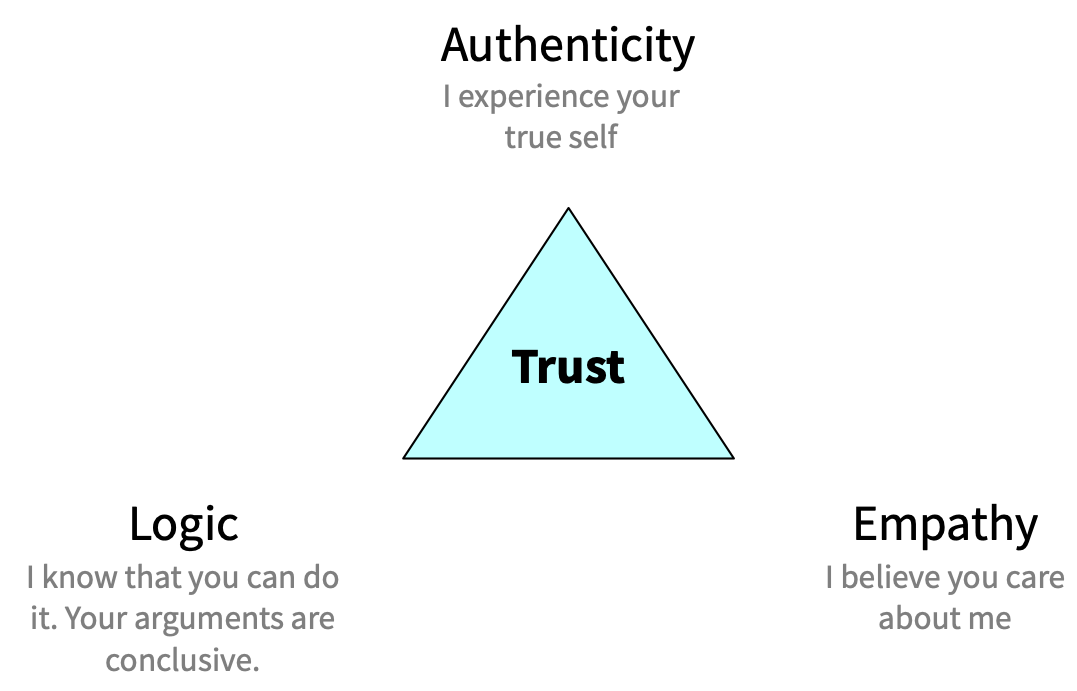Five steps to building trust
These Five Steps to Building Trust grew out of our recent Meetup on Growing Adaptive Organizations . There we had a very interesting topic last week: Leadership for Trust i.e. which aspects of leadership are important for building trust.
I present a small part of the discussion here. In a way, it's a natural continuation of a post on Simon Sinek's Infinite Games.
The value of trust
Trust exists in interpersonal relationships. Humans have a natural predisposition to trust and to judge trustworthiness. This can be attributed to the neurobiological structure and activity of the human brain [Wikipedia].
So far so good. But why is this important and what makes trust a productivity factor? That's where the following quote helps:
Trust is a mechanism for reducing the complexity of social interactions ( ... to a level that allows the individual to remain capable of acting in his environment).
Niklas Luhmann Tweet
This changes a lot: Trust is therefore not something for the Christmas speech and for feeling good, but a real productivity factor.
The Triangle of Trust
The Trust Triangle I found in a Harvard Business Review article where consultants describe how they turned around a company's culture by consistently focusing on trust. The example they're working with is Uber, of all things.
Still, it's an interesting model that elegantly solves some problems for me, particularly the question of how the requirement for a trusting and transparent environment reconciles with delivering power and optimizing performance. The model shows that these demands do not have to contradict each other.
The trust triangle is based on the premise that there are three characteristics that make up trust in leadership:
Authenticity: people feel they know the real person.
Logic: people feel that you are going in the right direction
Empathy: people sense that you care about everyone, not just yourself
Studies have shown that you have to have all three qualities for a person to trust you. If you have two, but not the third, then there is no trust. Therefore, the leadership weakness is the one you should work on.
From this you can get a visualization of very simple experiential values for building trust.
Five steps to building trust
Be authentic
For others to believe you, you must be transparent and consistent - and honest.
Admit your mistakes - if you try to hide your mistakes, people will know you are dishonest.
Be open about your feelings, this is an important part of building trust.
An important aspect is also that you model the behavior you expect from others and influence the culture towards transparency and trust.
Take a risk
Gaining trust is a daily commitment - and it takes time. Don't expect too much too soon, start with small steps and make small commitments and as confidence grows you will find it easier to make bigger commitments. Give trust, and you will usually get trust back.
To put it bluntly:
Only when you trust other people can you expect them to trust you.
To build trust, both you and others must take risks to prove their trustworthiness. So be very careful how you communicate, and make sure the messages you send are the messages others receive.
Be clear about what you have to do and stick to your commitments. Being organized and competent is a critical part of building trust. It allows you to make a clear decision about whether you can say NO in time.
Be a supporter, coach, helper
Help others whenever you can. When you help another person, even if you don't benefit yourself, you build trust. Authentic friendliness helps build trust.
Acknowledging and appreciating the efforts of others shows that you are concerned about teamwork and strengthens the trust that others have in you.
Don't be selfish: When people don't appreciate a good deed, they seem selfish. Selfishness destroys trust.
For better or for worse: Value the relationships you have and don't take them for granted. We have the most confidence in people who are always there for us.
Be a team player
Take an active role on a team and contribute, and people will be more likely to respect and trust you. Part of building trust is showing your willingness to trust others.
Be open and consider what others are saying, show that you are actively listening, contribute your thoughts and give respectful feedback.
Do what you think is right
If you want to build trust, you have to be willing to upset others occasionally. People tend not to trust those who simply say what they think others want to hear.





